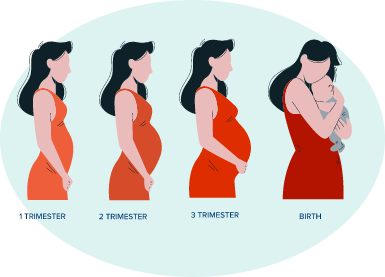





No lab centers are available in this city
Definition of High Blood Pressure in Pregnancy
Blood pressure is a measurement of the force that blood applies to blood vessel walls. When blood pressure rises above the standard range, high blood pressure results. High blood pressure, also known as hypertension. Some women already have high blood pressure before they get pregnant, while others suffer their first case of high blood pressure during pregnancy.
Healthcare providers might use the terms gestational hypertension or pregnancy-induced hypertension to refer to high blood pressure during pregnancy. Gestational hypertension is different from other types of hypertension because it starts in the second half of pregnancy and goes away after childbirth. Consult with a healthcare provider if one has high blood pressure. With proper care & management of high blood pressure, women can have a successful pregnancy and deliver a healthy baby.
Types of Hypertension Pregnancy
Below mentioned are the most common types of high blood pressure during pregnancy:
Chronic Hypertension
Chronic hypertension refers to elevated blood pressure occurring either prior to pregnancy or before the 20th week of gestation. In general, the normal blood pressure range during pregnancy is below 120/80 mm Hg. Chronic hypertension poses risks such as preeclampsia, a serious condition that can develop during the second or third trimester of pregnancy. It's important to note that this type of high blood pressure may persist even after giving birth.
Gestational hypertension
This condition refers to high blood pressure that occurs after the 20th week of pregnancy. In many cases, it does not cause any discomfort or harm to you or your baby, and you may not experience any other symptoms. However, in certain instances, this type of hypertension can be severe and result in complications such as low birth weight or premature birth. It may also progress to preeclampsia. Although it typically resolves within three months after delivery, it can increase the possibility of developing high blood pressure in the future.
Preeclampsia
Preeclampsia is a condition of sudden high blood pressure after the 20th week of pregnancy, during the third trimester. It involves a significant increase in blood pressure and can potentially harm vital organs like the liver, kidneys, and brain. Seizures may occur, along with noticeable swelling in the legs, arms, and face. Preeclampsia poses a serious threat to both the mother and the baby, and in some cases, it can be life-threatening. It's important to note that some women develop preeclampsia after giving birth, known as postpartum preeclampsia.
Symptoms of High Blood Pressure During Pregnancy
The symptoms of high blood pressure in pregnancy can resemble those of a normal condition. However, there are additional symptoms that some individuals may experience, which could be indicative of high blood pressure in pregnancy. These symptoms include:
Causes of High Blood Pressure in Pregnancy
The causes of high blood pressure in pregnancy can vary and these include:
How to Manage High Blood Pressure During Pregnancy?
During routine prenatal check-ups, the healthcare provider will measure blood pressure. If one is diagnosed with high blood pressure, the first immediate step will be close monitoring to ensure proper care and minimize the risk of complications. Proper management of the condition may include:
In some cases, there are chances of normal delivery even with high blood pressure.
When to See an OB/GYN?
If one has an abnormal BP range during pregnancy, seeing an OB/GYN for checkups and monitoring is important. They can assess conditions, track blood pressure levels, and provide appropriate guidance and treatment to ensure the well-being of mother and baby. Depending on the severity of hypertension, OB/GYN may recommend lifestyle changes, such as maintaining a healthy diet to reduce high blood pressure during pregnancy, regular exercise, and prenatal care checkups.
One can easily schedule diagnostic tests at Max Lab for their convenience. We offer various tests, including blood tests, imaging, pathology, genetic testing, and specialized diagnostic procedures. Utilizing cutting-edge diagnostic technology, we provide accurate and reliable results, ensuring the highest standard of healthcare for our patients.



Get ready for your baby's arrival
Sign up takes less than 60 secs and gives you access to your offers, orders and lab tests.
Looks like you are not registered with us. Please Sign up to proceed
OTP will be sent to this number by SMS
We have successfully received your details. One of the agents will call you back soon.
 To reach our help desk call 9213188888
To reach our help desk call 9213188888
No Lab Centers are available in this city
Looks like you are not registered with us. Please Sign up to proceed
OTP will be sent to this number by SMS
Not Registered Yet? Signup now.Looks like you are not registered with us. Please Sign up to proceed





 7982100200
7982100200.png)